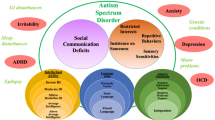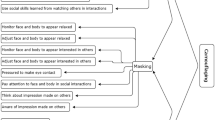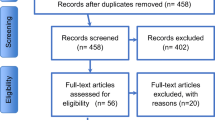Abstract
The relationship between brain development and clinical heterogeneity in autism (ASD) is unknown. This study examines the Social Responsiveness Scale (SRS) in relation to the longitudinal development of cortical thickness. Participants (N = 91 ASD, N = 56 TDC; 3–39 years at first scan) were scanned up to three times over a 7-year period. Mixed-effects models examined cortical thickness in relation to SRS score. ASD participants with higher SRS scores showed regionally increased age-related cortical thinning. Regional thickness differences and reduced age-related cortical thinning were found in predominantly right lateralized regions in ASD with decreasing SRS scores over time. Our findings emphasize the importance of examining clinical phenotypes in brain-based studies of ASD.



Similar content being viewed by others
References
Akaike, H. (1974). A new look at the statistical model identification. IEEE Transactions on Automatic Control, 19, 716–723.
American Psychiatric Association. (1994). Diagnostic and statistical manual of mental disorders (4th ed.). Washington, DC, American Psychiatric Association.
Blanken, L. M., et al. (2015). Cortical morphology in 6- to 10-year old children with autistic traits: A population-based neuroimaging study. American Journal of Psychiatry, 172, 479–486. https://doi.org/10.1176/appi.ajp.2014.14040482.
Chung, M. K., Robbins, S. M., Dalton, K. M., Davidson, R. J., Alexander, A. L., & Evans, A. C. (2005). Cortical thickness analysis in autism with heat kernel smoothing. Neuroimage, 25, 1256–1265. https://doi.org/10.1016/j.neuroimage.2004.12.052. p do.
Constantino, J. N. (2002). The Social Responsiveness Scale. Los Angeles: Western Psychological Services.
Constantino, J. N., et al. (2003). Validation of a brief quantitative measure of autistic traits: Comparison of the social responsiveness scale with the autism diagnostic interview-revised. Journal of Autism and Developmental Disorders 33, 427–433.
Constantino, J. N., et al. (2009). Developmental course of autistic social impairment in males. Development and Psychopathology, 21, 127–138. https://doi.org/10.1017/S095457940900008X.
Constantino, J. N., Przybeck, T., Friesen, D., & Todd, R. D. (2000). Reciprocal social behavior in children with and without pervasive developmental disorders. Journal of Developmental and Behavioral Pediatrics: JDBP, 21, 2–11.
Desikan, R. S., et al. (2006). An automated labeling system for subdividing the human cerebral cortex on MRI scans into gyral based regions of interest. Neuroimage 31, 968–980. https://doi.org/10.1016/j.neuroimage.2006.01.021.
Doyle-Thomas, K. A., et al. (2013). Effects of age and symptomatology on cortical thickness in autism spectrum disorders. Research in Autism Spectrum Disorders, 7, 141–150. https://doi.org/10.1016/j.rasd.2012.08.004.
Ecker, C., et al. (2013). Brain surface anatomy in adults with autism: The relationship between surface area, cortical thickness, and autistic symptoms. JAMA Psychiatry, 70, 59–70. https://doi.org/10.1001/jamapsychiatry.2013.265.
Ecker, C., et al. (2014). The effect of age, diagnosis, and their interaction on vertex-based measures of cortical thickness and surface area in autism spectrum disorder. Journal of Neural Transmission, 121, 1157–1170. https://doi.org/10.1007/s00702-014-1207-1.
Foster, N. E., et al. (2015). Structural gray matter differences during childhood development in autism spectrum disorder: A multimetric approach. Pediatric Neurology, 53, 350–359. https://doi.org/10.1016/j.pediatrneurol.2015.06.013.
Frazier, T. W., et al. (2012). Validation of proposed DSM-5 criteria for autism spectrum disorder. Journal of the American Academy of Child and Adolescent Psychiatry, 51, 28e3–40e3. https://doi.org/10.1016/j.jaac.2011.09.021.
Frazier, T. W., et al. (2014b). Demographic and clinical correlates of autism symptom domains and autism spectrum diagnosis. Autism, 18, 571–582. https://doi.org/10.1177/1362361313481506.
Frazier, T. W., Ratliff, K. R., Gruber, C., Zhang, Y., Law, P. A., & Constantino, J. N. (2014a). Confirmatory factor analytic structure and measurement invariance of quantitative autistic traits measured by the social responsiveness scale-2. Autism, 18, 31–44. https://doi.org/10.1177/1362361313500382.
Hadjikhani, N., Joseph, R. M., Snyder, J., & Tager-Flusberg, H. (2006). Anatomical differences in the mirror neuron system and social cognition network in autism. Cereb Cortex, 16, 1276–1282. https://doi.org/10.1093/cercor/bhj069.
Hardan, A. Y., Libove, R. A., Keshavan, M. S., Melhem, N. M., & Minshew, N. J. (2009). A preliminary longitudinal magnetic resonance imaging study of brain volume and cortical thickness in autism. Biological Psychiatry, 66, 320–326. https://doi.org/10.1016/j.biopsych.2009.04.024.
Hardan, A. Y., Muddasani, S., Vemulapalli, M., Keshavan, M. S., & Minshew, N. J. (2006). An MRI study of increased cortical thickness in autism. American Journal of Psychiatry, 163, 1290–1292.
Hazlett, H. C., et al. (2011). Early brain overgrowth in autism associated with an increase in cortical surface area before age 2 years. Archives of General Psychiatry, 68, 467–476. https://doi.org/10.1001/archgenpsychiatry.2011.39.
Hedrick, A., et al. (2012). Autism risk gene MET variation and cortical thickness in typically developing children and adolescents. Autism Research: Official Journal of the International Society for Autism Research, 5, 434–439. https://doi.org/10.1002/aur.1256.
Hus, V., Bishop, S., Gotham, K., Huerta, M., & Lord, C. (2013). Factors influencing scores on the social responsiveness scale. Journal of Child Psychology and Psychiatry 54, 216–224. https://doi.org/10.1111/j.1469-7610.2012.02589.x.
Hyde, K. L., Samson, F., Evans, A. C., & Mottron, L. (2010). Neuroanatomical differences in brain areas implicated in perceptual and other core features of autism revealed by cortical thickness analysis and voxel-based morphometry. Human Brain Mapping 31, 556–566. https://doi.org/10.1002/hbm.20887.
Jiao, Y., Chen, R., Ke, X., Chu, K., Lu, Z., & Herskovits, E. H. (2010). Predictive models of autism spectrum disorder based on brain regional cortical thickness. Neuroimage, 50, 589–599. https://doi.org/10.1016/j.neuroimage.2009.12.047.
Kraemer, H. C., Yesavage, J. A., Taylor, J. L., & Kupfer, D. (2000). How can we learn about developmental processes from cross-sectional studies, or can we?. American Journal of Psychiatry, 157, 163–171.
Lainhart, J. E., et al. (2006). Head circumference and height in autism: A study by the Collaborative Program of Excellence in Autism. American Journal of Medical Genetics, 140, 2257–2274.
Lange, N., Fletcher, P. T., & Zygmunt, K. M. (2013). FindMinIC: Find Models with Minimum IC. R package version 1.6. http://cran.r-project.org/package=FindMinIC.
Libero, L. E., DeRamus, T. P., Deshpande, H. D., & Kana, R. K. (2014). Surface-based morphometry of the cortical architecture of autism spectrum disorders: Volume, thickness, area, and gyrification. Neuropsychologia, 62, 1–10. https://doi.org/10.1016/j.neuropsychologia.2014.07.001.
Lord, C., et al. (2000). The autism diagnostic observation schedule-generic: A standard measure of social and communication deficits associated with the spectrum of autism. Journal of Autism and Developmental Disorders 30, 205–223.
Lord, M., Rutter, A., & LeCouteur, A. (1994). Autism diagnostic interview-revised: A revised version of a diagnostic interview for caregivers of individuals with possible pervasive developmental disorders. Journal of Autism and Developmental Disorders, 24, 659–685.
Lowe, J. K., Werling, D. M., Constantino, J. N., Cantor, R. M., & Geschwind, D. H. (2015). Social responsiveness, an autism endophenotype: Genome wide significant linkage to two regions on chromosome 8. American Journal of Psychiatry, 172, 266–275. https://doi.org/10.1176/appi.ajp.2014.14050576.
Mak-Fan, K. M., Taylor, M. J., Roberts, W., & Lerch, J. P. (2012). Measures of cortical grey matter structure and development in children with autism spectrum disorder. Journal of Autism and Developmental Disorders, 42, 419–427. https://doi.org/10.1007/s10803-011-1261-6.
Misaki, M., Wallace, G. L., Dankner, N., Martin, A., & Bandettini, P. A. (2012). Characteristic cortical thickness patterns in adolescents with autism spectrum disorders: Interactions with age and intellectual ability revealed by canonical correlation analysis. Neuroimage, 60, 1890–1901. https://doi.org/10.1016/j.neuroimage.2012.01.120.
Ohta, H., Nordahl, C. W., Iosif, A. M., Lee, A., Rogers, S., & Amaral, D. G. (2016). Increased surface area, but not cortical thickness, in a subset of young boys with autism spectrum disorder. Autism Research: Official Journal of the International Society for Autism Research 9, 232–248. https://doi.org/10.1002/aur.1520.
R Core Team. (2015). R: A language and environment for statistical computing. Vienna: R Foundation for Statistical Computing.
Raznahan, A., et al. (2012). Mapping cortical anatomy in preschool aged children with autism using surface-based morphometry. NeuroImage Clinical, 2, 111–119. https://doi.org/10.1016/j.nicl.2012.10.005.
Richter, J., et al. (2015). Reduced cortical thickness and its association with social reactivity in children with autism spectrum disorder. Psychiatry Research, 234, 15–24. https://doi.org/10.1016/j.pscychresns.2015.06.011.
Schaer, M., et al. (2013). Decreased frontal gyrification correlates with altered connectivity in children with autism. Frontiers in Human Neuroscience, 7, 750. https://doi.org/10.3389/fnhum.2013.00750.
Scheel, C., et al. (2011). Imaging derived cortical thickness reduction in high-functioning autism: Key regions and temporal slope. Neuroimage, 58, 391–400. https://doi.org/10.1016/j.neuroimage.2011.06.040.
Schumann, C. M., et al. (2010). Longitudinal magnetic resonance imaging study of cortical development through early childhood in autism. The Journal of Neuroscience: The Official Journal of the Society for Neuroscience, 30, 4419–4427. https://doi.org/10.1523/JNEUROSCI.5714-09.2010.
Smith, E., et al. (2016). Cortical thickness change in autism during early childhood. Human Brain Mapping, 37, 2616–2629. https://doi.org/10.1002/hbm.23195.
Tu, P. C., Hsu, J. W., Lan, C. C., Liu, C. C., Su, T. P., & Chen, Y. S. (2016). Structural and functional correlates of a quantitative autistic trait measured using the social responsive scale in neurotypical male adolescents. Autism Research: Official Journal of the International Society for Autism Research, 9, 570–578. https://doi.org/10.1002/aur.1535.
Wallace, G. L., et al. (2012). Distinct cortical correlates of autistic versus antisocial traits in a longitudinal sample of typically developing youth. The Journal of Neuroscience: The Official Journal of the Society for Neuroscience, 32, 4856–4860. https://doi.org/10.1523/JNEUROSCI.6214-11.2012.
Wallace, G. L., et al. (2015). Longitudinal cortical development during adolescence and young adulthood in autism spectrum disorder: Increased cortical thinning but comparable surface area changes. Journal of the American Academy of Child and Adolescent Psychiatry, 54, 464–469. https://doi.org/10.1016/j.jaac.2015.03.007.
Wallace, G. L., et al. (2017). Divergence of age-related differences in social-communication: Improvements for typically developing youth but declines for youth with autism spectrum disorder. Journal of Autism and Developmental Disorders, 47, 472–479. https://doi.org/10.1007/s10803-016-2972-5.
Wallace, G. L., Dankner, N., Kenworthy, L., Giedd, J. N., & Martin, A. (2010). Age-related temporal and parietal cortical thinning in autism spectrum disorders. Brain, 133, 3745–3754. https://doi.org/10.1093/brain/awq279.
Wallace, G. L., Robustelli, B., Dankner, N., Kenworthy, L., Giedd, J. N., & Martin, A. (2013). Increased gyrification, but comparable surface area in adolescents with autism spectrum disorders. Brain, 136, 1956–1967. https://doi.org/10.1093/brain/awt106.
Yamasaki, S., et al. (2010). Reduced gray matter volume of pars opercularis is associated with impaired social communication in high-functioning autism spectrum disorders. Biological Psychiatry, 68, 1141–1147. https://doi.org/10.1016/j.biopsych.2010.07.012.
Yang, D. Y., Beam, D., Pelphrey, K. A., Abdullahi, S., & Jou, R. J. (2016). Cortical morphological markers in children with autism: A structural magnetic resonance imaging study of thickness, area, volume, and gyrification. Molecular Autism, 7, 11. https://doi.org/10.1186/s13229-016-0076-x.
Zielinski, B. A., et al. (2014). Longitudinal changes in cortical thickness in autism and typical development. Brain, 137, 1799–1812. https://doi.org/10.1093/brain/awu083.
Funding
The funding was provided by National Institute of Mental Health (R01 MH080826, R01 MH084795, R01 MH097464, K08 MH100609, K08 MH092697), Eunice Kennedy Shriver National Institute of Child Health and Human Development (P30 HD003352, U54 HD090256), Poelman Foundation, Primary Children's Foundation, the Brain and Behavior Research Foundation and the Hartwell Foundation. The content is solely the responsibility of the authors and does not necessarily represent the official views of the National Institutes of Mental Health, the National Institute of Child Health and Development or the National Institutes of Health.
Author information
Authors and Affiliations
Contributions
MDP conceived of the study, performed statistical analysis and drafted the manuscript; BZ helped with study design and draft of the manuscript; AF helped with data collection and coordination of the study; TA helped with imaging data collection and management; BT helped with study design and provided statistical expertise; JA provided input in study design; EB, JL, NL, AA all provided input in study design and conceived of the larger ASD study that provided the funding for the data collection. All authors approved and read the final manuscript.
Corresponding author
Ethics declarations
Conflict of interest
The authors declare that they have no conflict of interest.
Ethical Approval
All procedures in studies involving human participants were in accordance with the ethical standards of the institutional and/or national research committee and with the 1964 Helsinski declaration and its later amendments or comparable ethical standards.
Informed Consent
Informed consent was obtained from all individual participants included in the study.
Electronic supplementary material
Below is the link to the electronic supplementary material.
Rights and permissions
About this article
Cite this article
Prigge, M.B.D., Bigler, E.D., Travers, B.G. et al. Social Responsiveness Scale (SRS) in Relation to Longitudinal Cortical Thickness Changes in Autism Spectrum Disorder. J Autism Dev Disord 48, 3319–3329 (2018). https://doi.org/10.1007/s10803-018-3566-1
Published:
Issue Date:
DOI: https://doi.org/10.1007/s10803-018-3566-1




